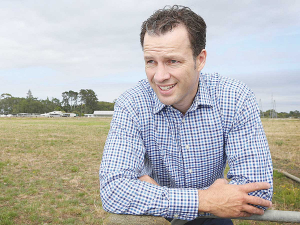Farmers are willing to work with the Government on climate change solutions but warn there are no silver bullets.
DairyNZ chief executive Tim Mackle says farmers want the Government to understand that it is about making incremental changes across the whole farm system.
“While many solutions are known, some are not, which is why DairyNZ and others are investing heavily in research,” he says.
“It is critical the Government supports farmers to make change over a generation and the pace of other regulation recognises the efforts being made by the dairy sector.”
Mackle says dairy farmers share the Government’s ambition to reduce climate change emissions and last week’s declaration of a climate emergency further highlights the issue’s importance.
He adds that the dairy sector’s climate change commitments and research are geared at supporting farmers to reduce emissions, to help achieve national greenhouse gas targets.
“Dairy farmers are taking climate change seriously and the sector is committed to playing our part in tackling climate change and reducing our overall footprint,” says Mackle.
Internationally, New Zealand already stacks up well, as one of the most sustainable and emission efficient dairy producers in the world.
“If all dairy producers were as efficient as New Zealand, more than half the global emissions from dairy could be removed.
“But we know we can be even better and the dairy sector is 100% committed to this.”
Mackle says DairyNZ, as dairy farming’s industry good organisation, has a wide range of work underway and is investing dairy farmers’ levy in climate change solutions developed through science.
“This includes research into different farm system options, such as feed types and use, improved fertiliser and effluent use, and options for on-farm sequestration of carbon.”
DairyNZ is also informing dairy farmers on their greenhouse gas emissions footprint, how to reduce emissions and improve profitability. This is being delivered to farmers through the Step Change programme, which highlights the importance of looking at nutrient loss, emissions and profitability together.
Last week, Prime Minister Jacinda Ardern announced a climate change emergency, joining New Zealand to more than 1800 jurisdictions in 32 countries in avoiding more than 1.5C rise in global warming.
However, a group of farmers and scientists set up to present facts on ruminant methane claim the Government is “misleading the public and falsely blaming farmers to concoct an emergency”.
The group is challenging the popular claim that 48% of NZ’s emissions that constitute the emergency come from agriculture.
F.A.R.M chairman, Robin Grieve says farms are utilising as much carbon dioxide as they produce when they grow grass and sequester CO2 in the soil.
“While the country’s livestock numbers are stable, as they have been for a decade, no additional Methane is entering the atmosphere so no new warming is occurring,” he claims.
Grieve says there is a balanced situation, which is being ignored by the politicians.
“Methane released by cows and sheep oxidises into CO2 and water vapour in the atmosphere but for those animals to produce that Methane they must eat grass that takes in CO2 – photosynthesis.”


















